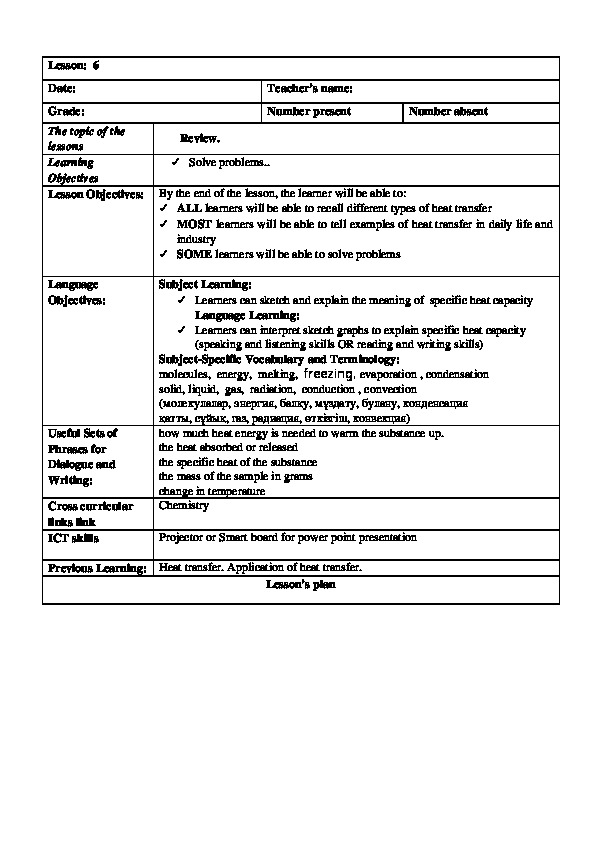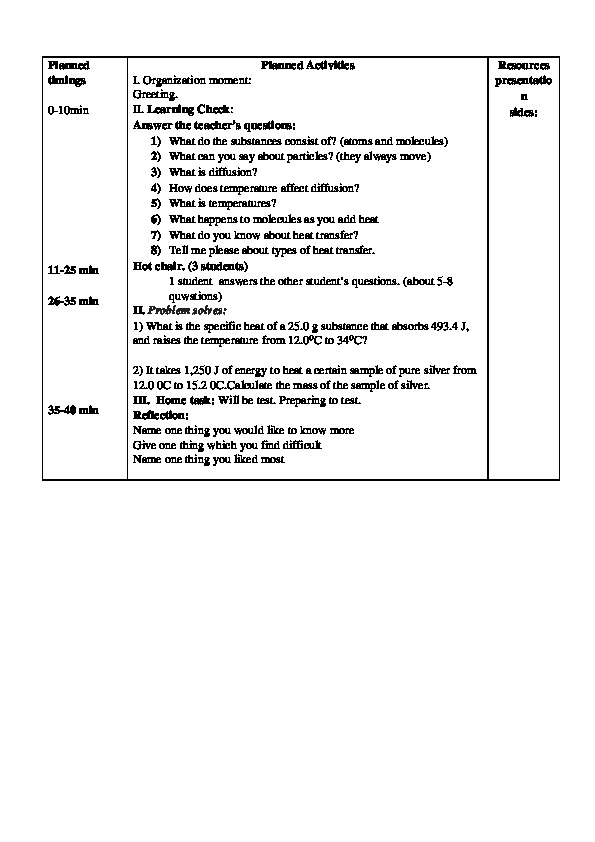Subject Learning:
Learners can sketch and explain the meaning of evaporation and condensation.
Lesson: 6
Date:
Grade:
The topic of the
lessons
Learning
Objectives
Lesson Objectives: By the end of the lesson, the learner will be able to:
Teacher’s name:
Number present
Review.
✓ Solve problems..
Number absent
✓ ALL learners will be able to recall different types of heat transfer
✓ MOST learners will be able to tell examples of heat transfer in daily life and
✓ SOME learners will be able to solve problems
industry
Language
Objectives:
Useful Sets of
Phrases for
Dialogue and
Writing:
Cross curricular
links link
ICT skills
Subject Learning:
✓ Learners can sketch and explain the meaning of specific heat capacity
Language Learning:
✓ Learners can interpret sketch graphs to explain specific heat capacity
(speaking and listening skills OR reading and writing skills)
SubjectSpecific Vocabulary and Terminology:
molecules, energy, melting, freezing, evaporation , condensation
solid, liquid, gas, radiation, conduction , convection
(молекулалар, энергия, балқу, мұздату, булану, конденсация
қатты, сұйық, газ, радиация, өткізгіш, конвекция)
how much heat energy is needed to warm the substance up.
the heat absorbed or released
the specific heat of the substance
the mass of the sample in grams
change in temperature
Chemistry
Projector or Smart board for power point presentation
Previous Learning: Heat transfer. Application of heat transfer.
Lesson’s planResources
presentatio
n
sides:
Planned
timings
010min
1125 min
2635 min
3540 min
Planned Activities
I. Organization moment:
Greeting.
II. Learning Check:
Answer the teacher’s questions:
1) What do the substances consist of? (atoms and molecules)
2) What can you say about particles? (they always move)
3) What is diffusion?
4) How does temperature affect diffusion?
5) What is temperatures?
6) What happens to molecules as you add heat
7) What do you know about heat transfer?
8) Tell me please about types of heat transfer.
Hot chair. (3 students)
1 student answers the other student’s questions. (about 58
quwstions)
II. Problem solves:
1) What is the specific heat of a 25.0 g substance that absorbs 493.4 J,
and raises the temperature from 12.0⁰C to 34⁰C?
2) It takes 1,250 J of energy to heat a certain sample of pure silver from
12.0 0C to 15.2 0C.Calculate the mass of the sample of silver.
III. Home task: Will be test. Preparing to test.
Reflection:
Name one thing you would like to know more
Give one thing which you find difficult
Name one thing you liked most


